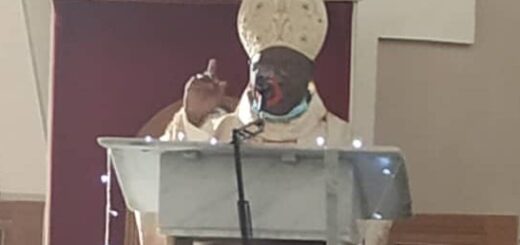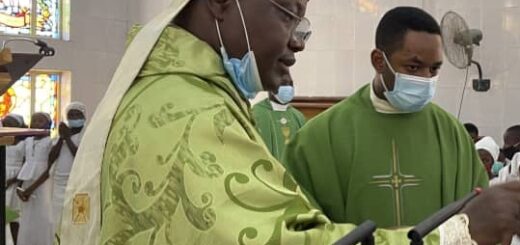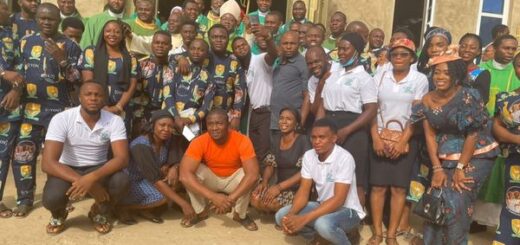Victory Through Suffering
by ARCH BISHOP · April 10, 2022
Palm Sunday, Year C, April 10, 2022, St. Michael’s Parish, Piwoyi, Homily by Archbishop I. A. Kaigama
Readings: Is. 50: 4-7; Ps. 21(22): 8-9, 17-20, 23-24; Phil. 2: 6-11; Lk. 22: 14-23:56
Victory Through Suffering
Palm or Passion Sunday points to the end of the Lenten Season by ushering us into the Holy Week, during which we reflect on how much God loves us, and the extent He goes to redeem us from sin as demonstrated by Jesus’ self-giving love. Jesus was pierced through for our faults and crushed for our sins (cf. Is. 53:5). This ceremony today also reminds us of the new life, hope and victory that come when we unite our suffering with that of Jesus.
In our first reading, Prophet Isaiah presents the third of the Servant Songs, a Suffering Servant of Yahweh, whose submission to the Lord God was total, despite the insults and rejection and immeasurable pains he endured. The early Christians identified this Servant of Yahweh with Jesus (cf. Acts 8:32-35), who did not cling to His divinity but willingly surrendered himself to experience suffering, humiliation and death for our sake.
Jesus’ cry in the passion narrative, “My God, my God, why have you forsaken me?” (Mk. 15:34) is meant to highlight the complexity and contradiction of human existence. Peter denied Jesus three times even after being His student for three years. Pilate found Jesus not guilty but was afraid to release Him. Simon of Cyrene was summoned to assist Jesus carry His cross, but at Golgotha, they crucified Him while the people watched helplessly and the leaders jeered at Him.
The passion of Jesus is a story of betrayal. During His public ministry, Jesus went about and healed the sick, fed the hungry, cast out demons, raised the dead and even walked on the water, and the people flocked after Him. Once, they even wanted to catch Him by force to make Him a king.
Pronounced unjustly as a criminal, very few people were still ready to follow Him. His closest friend Peter denied him, others went into hiding when He was arrested. Surprisingly, those who were shouting “hosanna to the son of David,” now turned round to shout “crucify him”.
Many of us may be very quick to condemn the Jews or to condemn Judas for betraying Jesus, Peter for denying Him and the other disciples for running into hiding for fear of being arrested with Him. Rather than judge and condemn, we are invited today to renew our commitment to stay with Jesus and to endure the passion with Him, for our victory lies in our endurance of hardship, suffering and pain.
The highest demonstration of the love of God for humanity is captured in John 3:16: “God so loved the world that he gave his only begotten so that everyone who believes in him should not perish but have eternal life”. The undefiled and unconditional love Jesus showed us is the same love we are to show to the poor, the lowly, the marginalised and the less privileged in our society.
From the story of the suffering and death of Jesus, we understand that suffering is part of our human existence. Sometimes in the midst of what we suffer we tend to think that God has forsaken us. God does not neglect us. The suffering we sometimes undergo is meant to help us get to where God wants us to be. Whenever we see ourselves going through some forms of suffering, let us remember that our Lord Jesus Christ had the same experience, but emerged victorious. We should unite our sufferings with His in order to also share in His glory.
Jesus teaches us humility today. We are told that Jesus entered Jerusalem riding on a donkey (cf. Zech. 9:9), a symbol of peace. The donkey was an animal the simple and common country people used. Jesus’ humility contrasted with the majesty of worldly leaders, who would ride on horses and sometimes over the prostrate bodies of their foes.
By this, Jesus is teaching leaders to live simply, and to give up a lot of their excesses for the good of their people. The poor and needy, largely the victims of bad and corrupt governance are often made to suffer and sacrifice for the comfort of their leaders. They are victims of social, economic, political exploitation and manipulation, whereas the corrupt leaders seek their personal interests instead of what brings progress, national growth and sustainable development. Leaders must show their followers, especially the youths, the example that wishing and dreaming big alone are not enough to make them who they want to become; they can only achieve this through hard work and honesty.
Like the suffering Servant of Yahweh in today’s readings, the innocent women, children and all the vulnerable people, the victims of kidnapping, banditry, and Boko Haram insurgency in Nigeria are crying and asking: “My God, My God, why have you forsaken us?” It is the same cry in the hearts of many Nigerian youths and students, forced to stay home due to no fault of theirs. However, despite the pains and fears, we are hopeful of triumph someday, somehow, by God’s grace. Let us open our hearts to receive Christ as our King, the only true answer to our quest for happiness and meaning.
It was my intention to celebrate the Mass of Palm Sunday at our Pro-Cathedral, but when your Parish Priest, Rev. Fr. Cyril Osuji, described your locality as a ‘poor man’s hut behind a rich man’s backyard’, I was happy to schedule a pastoral visit to your parish and to administer the sacrament of confirmation on 121 candidates on this special day. I can see that you are a dynamic and vibrant parish community even though socially and economically disadvantaged. My dear parishioners of St. Michael, Piwoyi, I pray that you, your Parish Priest and all of us will reap the spiritual fruits of this Holy Week.
May Mary our Mother, the first and faithful disciple of Christ, be with us on this spiritual journey and may she channel our present hardships and predicaments to her Son Jesus Christ.




